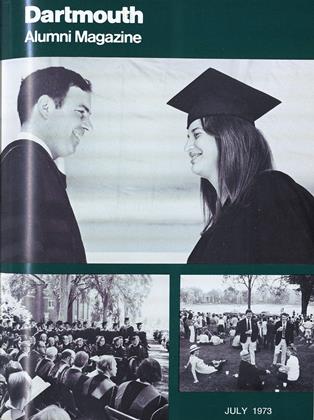Today most Americans live in a media-induced awareness of the problems now facing our nation. But awareness of a problem and solving it are far from identical. We all know about the deterioration of our scarred and abused environment, but what is being done about it? We all know that our urban areas are a blight. To most Americans cities connote slums and crime. Again, what is being done about them? We all know about the energy crisis. It has been so widely publicized that the phrase "energy crisis" is almost a cliche. We all know that there are depressed areas in the United States. We all know that there exist areas in this country with inadequate health care. For each of these problems this question must still be asked – what is being done about it? All too often the answer is "Too little" or "Not enough." The task with which we are faced is to find solutions to these problems.
Four years ago, when we were freshmen, newspaper articles discussed the idealism of youth. In contrast, today we read that concern is expressed about youth's cynicism. What has happened? We have witnessed the struggle of Congress to assert itself as an effective institution in the face of an increasingly powerful executive branch. We have seen men in the executive branch sink into the mire of crime and corruption known as Watergate. Already polls show that many Americans, disgusted with Watergate, are weary of hearing about it. The expressed concern is that we will extend our disgust with the Watergate break-in and cover-up to everything connected with government, that we will blame Watergate on the system. Watergate was the activity of individuals; and, as such, we should take from it a lesson about the temptations of power and about the corruptibility of individuals; we must not take from it a jaded attitude towards government.
If we look back at the last four years, we realize how often the activities of Dartmouth students have been concerned with national issues. As students we have had an ever-present concern for national affairs and a willingness to get involved. During the spring term of our freshman year students struck over Kent State and the invasion of Cambodia. Many of you canvassed New Hampshire and Vermont to change people's minds about the Vietnam War. Some of you spoke to alumni groups. During our sophomore year several of you, in response to the invasion of Laos, went to Washington to talk to your Congressmen. During our junior year students worked in the Presidential primary campaigns. Many of you covered the campus, talking to other students, urging them to register and vote. Last fall, during our senior year, students campaigned in the national elections.
In these four years we have experienced an increasing maturity in outlook and an increasing willingness to work within the system. We have come to realize that moral outrage at America's flaws is easy. Solutions are hard. Problem solving requires work. It requires tolerance and understanding. It requires a willingness to work with the opposition, to work with those who disagree with us, to find mutually acceptable solutions. We must avoid the rhetoric of polarization. America is already polarized enough.
Today we, the Class of 1973, leave Dartmouth. Dartmouth has provided us with an unusual opportunity to develop and express our concern for national issues. Throughout our four years we have been constantly in the company of others, highly motivated and concerned people – faculty, administration, and other students. Our Dartmouth years have given us the heritage of a social conscience.
We must maintain this concern. We must remain active. We must not lose that which we had as students. We must not fall into the cynicism and inactivity of frustrated idealism. We have seen that the cumulative weight of public opinion can change governmental policy, but that it requires time and work and leadership. There are many problems now facing the United States. There will always be problems. Their solutions require both our awareness and our involvement. We must not betray the social conscience which our four years at Dartmouth have given us. We must sustain and nurture the concern we have demonstrated while we were students. If we do, something will be done.
Douglas Jabs, a resident of Wayland, Mass., was graduated summacum laude, with valedictory rank among the members of theClass of 1973. He achieved a four-year average of 4.9354 on a 5.0scale and received seven citations from his professors for distinguishedacademic work. A chemistry major, he will studymedicine at Johns Hopkins University.
 View Full Issue
View Full Issue
More From This Issue
-
 Feature
Feature1923 – Great Class of a Great College
July 1973 By Charles J. Zimmerman '23 -
 Feature
FeatureAlumni Awards
July 1973 -
 Feature
FeatureHONORARY DEGREE CITATIONS
July 1973 -
 Feature
FeatureStevenson '57 Heads Alumni Council
July 1973 -
 Feature
FeatureCOMMENCEMENT 1973
July 1973 By CHARLES J. KERSHNER -
 Feature
FeatureValedictory to '73
July 1973 By John G. Kemeny
Features
-
 Cover Story
Cover StoryA Century of Photos
Nov/Dec 2005 -
 Cover Story
Cover StoryPiece of the Action: The Merlino Miss
OCTOBER 1994 By George Anastasia -
 Cover Story
Cover StoryThe Dartmouth Disease
SEPTEMBER 1983 By George O'Connell -
 Feature
FeatureCommencement
JUNE 1977 By JAMES L. FARLEY '42 -
 Feature
FeatureOh, You Shouldn't Have!
MAY 1992 By JONATHAN DOUGLAS -
 Feature
FeatureOccom's Heirs Get a Home
September 1995 By Karen Endicott

